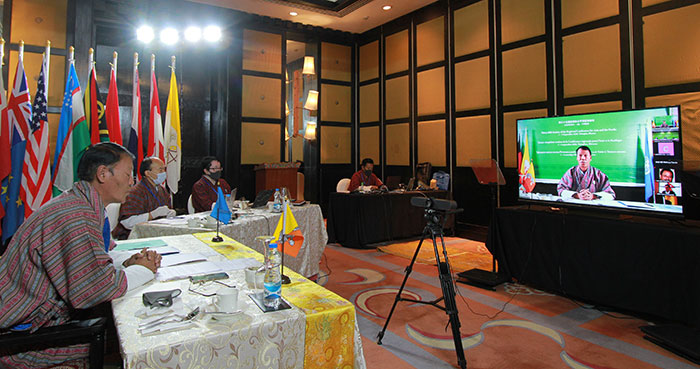Choki Wangmo
The Covid-19 impact and consequent disruption in food supply chains and systems in the Asia-Pacific region since February has endangered more than half of the world’s undernourished people in the region.
The number of hungry people in Southern Asia is expected to rise by nearly a third to 330 million by 2030.
To mitigate impacts of the pandemic on food, agriculture, and livelihoods in the region, 46 representatives from member countries participated in the 35th session of the Food and Agriculture Organisation (FAO) Asian and Pacific Regional Conference (APRC), virtually hosted by Bhutan in Thimphu yesterday.
The chair of the conference and secretary of the agriculture ministry, Rinzin Dorji, said that despite impacts from the pandemic, many countries in the region were making efforts to reduce poverty and hunger.
“Covid-19 has helped the government fast-forward some of the national goals like food security.”
FAO Regional Representative for Asia and the Pacific, Jong-Jin Kim said: “We must come to terms with what is before us and recognise that the world and our region has changed. We must find new ways to move forward and ensure sustainable food security in the face of these two pandemics, as well as prepare for threats that can and will evolve in the future.”
The participants through interventions and experience sharing discussed on the FAO’s recently launched comprehensive Covid-19 response and recovery programme. The programme is designed to provide a flexible and coordinated global response that aims to ensure access to nutritious food for everyone.
It includes the mobilisation of all forms of resources and partnerships at country, regional and global level with the main aim to mitigate the immediate impacts of the pandemic while strengthening the longer-term resilience of food systems and livelihoods.
The four-day conference will consider new marketing channels like e-commerce and new technologies that will help reduce food losses, as these are critical to ensure the flow of nutritious foods and to generate improved incomes for those who work across the entire food and agriculture sectors.
The delegates examined the present situation of the region’s food security, with particular emphasis on implications linked to the spread of the coronavirus and its impact on food systems region-wide.
Members from 22 countries, representatives from the private and Civil Society Organisations shared their experiences about how farmers, consumers and government policies are adapting to the emerging food systems in the region.
A senior economist at the FAO, Elbehri Aziz, said that the restrictions due to the pandemic had resulted in difficulties for those involved in the food system to perform their tasks.
“Farmers producing perishable products in labour-intensive value chains are in an especially vulnerable position.”
The loss of income due to the economic downturn, therefore, could lead to deterioration of nutritional status, he said.
Asia-Pacific is home to 479 million of the world’s undernourished, while overweight and obesity continue to rise among children and adults.
To mitigate the pandemic’s impact on food security, nutrition, and agriculture, Elbehri Aziz recommended policy options such as controlling the spread of the virus and implementing physical distancing and appropriate health protocols to reduce fear and risks.
FAO has conducted rapid assessments of the pandemic’s impact on food security and nutrition in 20 countries of the region, including the Pacific Islands.
The conference attended by 400 delegates will end on September 4.


